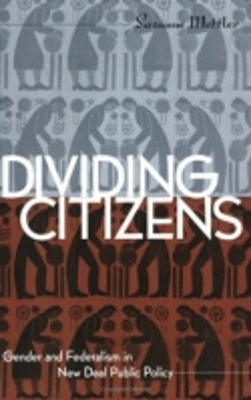The New Deal was not the same deal for men and women—a finding strikingly demonstrated in Dividing Citizens. Rich with implications for current debates over citizenship and welfare policy, this book provides a detailed historical account of how governing institutions and public policies shape social status and civic life. In her examination of the impact of New Deal social and labor policies on the organization and character of American citizenship, Suzanne Mettler offers an incisive analysis of the formation and implementation of the pillars of the modern welfare state: the Social Security Act, including Old Age and Survivors' Insurance, Old Age Assistance, Unemployment Insurance, and Aid to Dependent Children (later known simply as "welfare"), as well as the Fair Labor Standards Act, which guaranteed the minimum wage.
Mettler draws on the methods of historical-institutionalists to develop a "structured governance" approach to her analysis of the New Deal. She shows how the new welfare state institutionalized gender politically, most clearly by incorporating men, particularly white men, into nationally administered policies and consigning women to more variable state-run programs. Differential incorporation of citizens, in turn, prompted different types of participation in politics. These gender-specific consequences were the outcome of a complex interplay of institutional dynamics, political imperatives, and the unintended consequences of policy implementation actions. By tracing the subtle and complicated political dynamics that emerged with New Deal policies, Mettler sounds a cautionary note as we once again negotiate the bounds of American federalism and public policy.
- ISBN10 0801485460
- ISBN13 9780801485466
- Publish Date 15 June 1998
- Publish Status Active
- Publish Country US
- Imprint Cornell University Press
- Format Paperback (US Trade)
- Pages 256
- Language English
